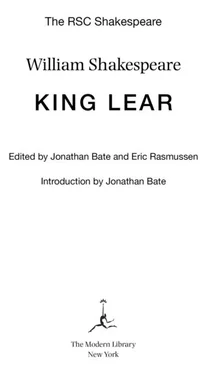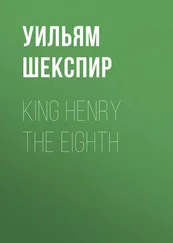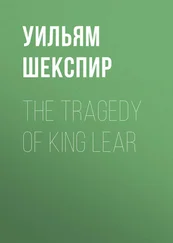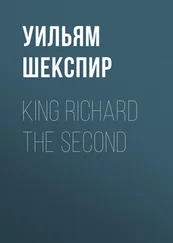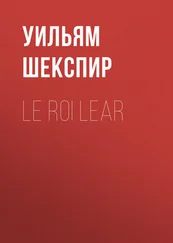уильям шекспир - King Lear
Здесь есть возможность читать онлайн «уильям шекспир - King Lear» весь текст электронной книги совершенно бесплатно (целиком полную версию без сокращений). В некоторых случаях можно слушать аудио, скачать через торрент в формате fb2 и присутствует краткое содержание. Год выпуска: 2011, ISBN: 2011, Издательство: Random House Publishing Group, Жанр: Старинная литература, на английском языке. Описание произведения, (предисловие) а так же отзывы посетителей доступны на портале библиотеки ЛибКат.
- Название:King Lear
- Автор:
- Издательство:Random House Publishing Group
- Жанр:
- Год:2011
- ISBN:978-1-58836-828-7
- Рейтинг книги:3 / 5. Голосов: 1
-
Избранное:Добавить в избранное
- Отзывы:
-
Ваша оценка:
- 60
- 1
- 2
- 3
- 4
- 5
King Lear: краткое содержание, описание и аннотация
Предлагаем к чтению аннотацию, описание, краткое содержание или предисловие (зависит от того, что написал сам автор книги «King Lear»). Если вы не нашли необходимую информацию о книге — напишите в комментариях, мы постараемся отыскать её.
King Lear — читать онлайн бесплатно полную книгу (весь текст) целиком
Ниже представлен текст книги, разбитый по страницам. Система сохранения места последней прочитанной страницы, позволяет с удобством читать онлайн бесплатно книгу «King Lear», без необходимости каждый раз заново искать на чём Вы остановились. Поставьте закладку, и сможете в любой момент перейти на страницу, на которой закончили чтение.
Интервал:
Закладка:
Three years later Peter Brook directed his groundbreaking production starring Paul Scofield (discussed in detail below). There have been numerous distinguished productions since: in 1968 Trevor Nunn directed with Eric Porter playing Lear; in 1974 Buzz Goodbody directed a pared-down version for the RSC’s small studio theater, The Other Place; in 1976 Trevor Nunn directed Donald Sinden as Lear; in 1979 Peter Ustinov played Lear in a production directed by Robin Phillips at Stratford, Ontario; Adrian Noble’s 1982 production with Michael Gambon is discussed below. In 1989 Jonathan Miller directed Eric Porter at the Old Vic; 1990 saw the Renaissance Theatre company’s production, directed by Kenneth Branagh with Richard Briers as Lear and Emma Thompson as the Fool; in the same year Nicholas Hytner directed John Wood at Stratford; in 1993 Noble directed the play at Stratford again, this time with Robert Stephens as Lear (discussed below). In 1997 in the (London) National’s intimate Cottesloe studio, Richard Eyre directed a production (his swan-song as artistic director) with Ian Holm playing Lear—a highly acclaimed production that was later recorded for television; in the same year Peter Hall directed Alan Howard at the Old Vic; and in 1999 Yukio Ninagawa directed Nigel Hawthorne for the RSC; in 2001 Julian Glover played Lear in Barry Kyle’s production at the Globe and the following year Jonathan Kent directed Oliver Ford-Davies at the Almeida, a performance much admired for its intelligence; Jonathan Miller again directed the play, this time for the 2002 Stratford Festival, Ontario, with Christopher Plummer in the lead; in 2004 Bill Alexander directed Corin Redgrave in a production that used a full conflated text and ran for nearly four hours; in 2007 the RSC’s Complete Works Festival in which all Shakespeare’s plays were performed closed with Trevor Nunn’s production at the Courtyard Theatre with Ian McKellen as King Lear (see interview with Nunn, below). Powerful small-scale productions include a touring one by Kaboodle Theatre Company (1991–94), which made very strong use of a mix of Oriental-imperial costumes and modernity (a feisty Cordelia in Doc Martens boots).
The tradition of adapting the play has been continued in the theater with versions such as Edward Bond’s radical rewriting, Lear (1972) and the Women’s Theatre Group and Elaine Feinstein’s feminist Lear’s Daughters , as well as Jane Smiley’s novel, A Thousand Acres (1997). On film, there were early silent versions in America and Italy (1909–10). A number of stage productions have been filmed, including Peter Brook’s, shot in a stark black-and-white style that intensified the existential bleakness of his stage version. Grigori Kozintsev (1970) produced a beautiful, deeply moving version featuring the sufferings of Russian peasants. It was based on a translation by Boris Pasternak and used haunting music by Dmitri Shostakovich. Akira Kurosawa’s Ran (1985), set in feudal Japan, substantially reworked Shakespeare’s play so as to eliminate Gloucester but incorporate the subplot material in a version in which Lear’s daughters become his married sons. It played a major part in stimulating renewed western interest in epic eastern cinema.
AT THE RSC
Lears for Our Time
Our own century seems better qualified to communicate and respond to the full range of experience in King Lear than any previous time, save possibly Shakespeare’s own. 17
In post–Second World War England, King Lear has been performed more times than in its entire prior performance history. The play speaks with special power to the contemporary psyche. In a violent age when atrocities, murders, poverty, and acts of self-destruction are commonly seen on television, the violence in the play, and its concerns about human rights, seem particularly apposite. However, Lear is so vast in its conception that, as well as societal concerns, it deals with very fundamental philosophical thoughts about what it is to be human in a godless world, or in a world where faith plays little part in the absurdity of human behavior.
Jan Kott’s influential book entitled Shakespeare Our Contemporary (1964) was of great inspiration to late-twentieth-century directors. His thoughts about King Lear as a play about “the disintegration of the world” prompted a landmark production of the play by Peter Brook, which would alter the way the play was conceived and the characters performed to this day:
In the 1950s it became apparent that the world might destroy itself through accidental nuclear warfare, and the plays of Samuel Beckett achieved international fame: Waiting for Godot (1953) showed a world of absurdity, Endgame (1957) a world without meaning at all. Soon afterward the Polish critic Jan Kott wrote an influential essay, “King Lear, or Endgame,” which viewed Shakespeare through the spectacles or blinkers of Beckett and emphasized the element of grotesque tragicomedy in the play. 18
Brook was also heavily influenced by the dramatic theories of Bertolt Brecht, with his desire to “alienate” the audience by breaking down the illusions of realism. Brecht’s influence was especially evident in the bare staging of Lear . Two large flats at either side of the stage moved in and out at angles to create internal and external spaces. The storm was created by three large rusty thunder sheets with a vibrating motor behind creating a hint of rumbling thunder. The lighting was deliberately bright and constant, only dimming for the storm scene and Gloucester’s blinding. Everything was seen with clarity, leaving no room for the dramatic signaling that darkness evokes. There was no background music. Brook firmly believed that Lear should be staged with no music at all. Music almost always controls our emotional reaction to a scene, and Brook was particularly keen to block any easy audience response.
J. C. Trewin described the set:
Visually we are taken to a terrifying world, a place of abstract symbols, a rust-flaking world, harsh and primitive. There are tall, coarse gray-white screens; metal shapes that might have been dredged from the sea-bed: things ancient, scaled with rust. As the night moves on, the stage grows barer and barer until nothing is left but the screens, and Lear and Gloucester play out their colloquy on a bleak infinity of stage; two voices at the world’s end. 19
Brook wanted this Lear to be a Lear of its time. He designed the production himself and wanted to create a totally believable society, both barbaric and sophisticated. It is notable that this production took place just after the Cuban missile crisis. He wished to create a nihilistic vision, to remove the sympathetic responses of the audience and blur the lines between good and evil in the play. As a result of this he was accused of distorting Shakespeare’s tragedy to enhance his own directorial viewpoint.
Brook’s interpretation meant that productions of Lear would never be the same after this point. Indeed, there have been very few productions since that have not followed his lead in some regard, whether their focus be political, metaphysical, or domestic.
Critics and directors of the Left have been quick to seize on Lear’s demand that the ruling class expose themselves “to feel what wretches feel, / That thou mayst shake the superflux to them” and Gloucester’s wish that “distribution should undo excess, / And each man have enough” as evidence of the play’s critique of existing political structures, and much recent criticism has discussed King Lear as a political drama reflecting the ideological concerns that were to divide England during the seventeenth century. 20
This trend in recent criticism has been reflected in performance. Set pre-First World War, the RSC’s 1976 production made reference to the conditions of those disenfranchised by war. One page of the program featured hundreds of faces of workhouse children; on another there was a bleak landscape with two figures in the distance, presumably working a land that yields little or nothing. In this production Donald Sinden’s acclaimed performance as Lear
Читать дальшеИнтервал:
Закладка:
Похожие книги на «King Lear»
Представляем Вашему вниманию похожие книги на «King Lear» списком для выбора. Мы отобрали схожую по названию и смыслу литературу в надежде предоставить читателям больше вариантов отыскать новые, интересные, ещё непрочитанные произведения.
Обсуждение, отзывы о книге «King Lear» и просто собственные мнения читателей. Оставьте ваши комментарии, напишите, что Вы думаете о произведении, его смысле или главных героях. Укажите что конкретно понравилось, а что нет, и почему Вы так считаете.
